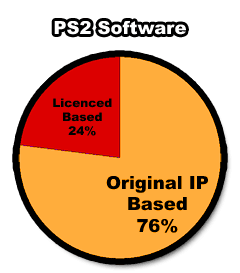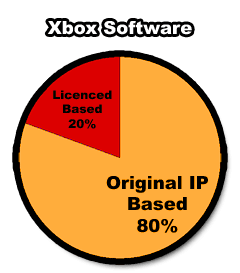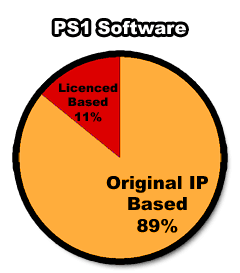I've always wanted to try to analyse game sales data but unfortunately it's not generally publicly available. Until recently that is. I discovered that Wikipedia supposedly has data for all games that have sold over 1 million units. Assuming their data is correct or close to correct here is my analysis.
It makes NO FRIKKEN SENSE TO BUY A LICENSE!
Here's the short version of the market for Licensed Based vs Original IP Based video game software for titles that sold 1 million or more units.



Why would anyone purchase a license when clearly about 80% of the market belongs to non−licensed titles. Why do most people in upper management think it's best to buy a license? Well, here are my thoughts:
1) They confuse licenses with sequels. By my definition, a license is defined as something from outside the game industry. For example the Spiderman series (very successful) is a license. The Harry Potter and Lord or the Rings games are licenses. On the other hand Metal Gear Solid 3 is not a license, it is a sequel to an original IP title. Without the original IP there could be no sequel.
2) They mix in sports titles with software over all. The above numbers remove sports. My argument for removing sports from my computations is, that I'll grant you that if you are going to make a sports title the stats show you are pretty much required to buy a license. On the other hand, if you are not making a sports title then the fact that sports need a license should have absolutely no barring whatsoever on the decision to use licensed IP or not.
I posted those 3 charts as they are probably the most currently relevant but below is the data from most major platforms.
| Platform | # Titles | Original Titles | Sequel To Original Titles | Licensed Titles | # Units | Original Units | Sequel To Original Units | Licensed Units | Original Based Units | Original Based Titles |
| PC | 46 | 50.00% | 45.65% | 4.35% | 128.21 | 61.63% | 36.86% | 1.51% | 95.65% | 98.49% |
| NES | 38 | 50.00% | 42.11% | 7.89% | 106.94 | 44.18% | 52.11% | 3.70% | 92.11% | 96.30% |
| SNES | 39 | 28.21% | 66.67% | 5.13% | 137.57 | 20.73% | 77.12% | 2.15% | 94.87% | 97.85% |
| N64 | 40 | 17.50% | 62.50% | 20.00% | 125.19 | 13.87% | 68.47% | 17.65% | 80.00% | 82.35% |
| GameCube | 34 | 8.82% | 85.29% | 5.88% | 70.77 | 7.38% | 88.33% | 4.30% | 94.12% | 95.70% |
| GameBoy | 46 | 10.87% | 76.09% | 13.04% | 228.9 | 30.30% | 65.47% | 4.24% | 86.96% | 95.76% |
| GBA | 50 | 4.00% | 72.00% | 24.00% | 119.67 | 2.33% | 81.50% | 16.17% | 76.00% | 83.83% |
| DS | 11 | 36.36% | 63.64% | 0.00% | 30.93 | 38.67% | 61.33% | 0.00% | 100.00% | 100.00% |
| PS1 | 62 | 27.42% | 61.29% | 11.29% | 184.59 | 26.14% | 67.90% | 5.96% | 88.71% | 94.04% |
| PS2 | 107 | 16.82% | 58.88% | 24.30% | 294.08 | 13.91% | 63.78% | 22.31% | 75.70% | 77.69% |
| Xbox | 30 | 33.33% | 46.67% | 20.00% | 53.69 | 37.79% | 46.84% | 15.37% | 80.00% | 84.63% |
key:
- # titles is the number of non-sports titles on that platform that sold over 1 million units
- Original Tiles, Sequel to Original Titles and Licensed Titles are the percent of total titles
- # units is the total number of units in millions for all tiles that sold over 1 million units
- Original Units, Sequel to Original Units and Licensed Units are the percent of total units.
What that means is lets say 4 titles sold over a million units for 3DO and that 2 of those were licensed titles. Therefore 50% of the titles were licensed based and 50% were original IP based. But, lets say the 2 original IP titles sold 4 million units each and the licensed titles only sold 1 million each. Then for all 4 titles 10 million units were sold 80% of which would original IP based units, 20% of which would be licensed units. Which number is more relevant I'm not entirely sure.
- The last 2 columns are just Original + Sequels added up for both titles and units since together they show the total percent of the market represented by Original IP based titles.
As you can see, it's pretty damn foolish to buy a license. You're giving up more than 80% of the market and nearly all sequel potential.
Some trivia I noticed. There were no million selling sports titles for SNES or Gameboy Advance at all. ZERO! Probably no surprise but there are a ton of sequels for Gameboy Advance. There is pretty much nothing licensed for PC.
How else did I fudge the numbers? Well, for NES, not that that's relevant anymore but, I didn't include Super Mario or Duck Hunt as both were pack−ins. They would have helped my case though since they are both Original IP based titles.
Also, as far as sequels go I considered anything based on an existing game to be a sequel. In other words for the stats above, Mario Kart is considered a sequel to Mario Bros as is Yoshi's Island. Since they use the same characters they are clearly riding off the popularity of Mario and Yoshi and don't deserve to be considered wholly original for the purpose of these stats. Still, they are not licensed.
For racing games, if they included licensed cars I consider them sports. If they didn't I considered them original IP. Example: Need for Speed is original IP. Gran Turismo is licensed sports. Tony Hawk is also a licensed sport. While you could add those titles in to support a licensing argument it would only change the numbers 1 or 2 percent.
Sequels of License Based titles (ie, Spiderman 2) were considered licensed based titles.
The other thing you can get from this is Sequels are everything. For most platforms they are 2/3s of the original IP based titles. Even DS is 2/3s sequels. For a few like GB, GameCube and GBA sequels are like 85−90%. Still, you can't publish a sequel unl ess you've made the original.
You could make the argument that licenses **might** be less risky than wholly original titles in some cases. If you look at GBA or PS2 you see that licenses sold more than wholly original titles. This was not true on Xbox or PS1 though and of course again, once you decide to go that route you've clearly given up any chance of getting any of that hot sequel action.
The conclusions:
#1: DON'T BUY A LICENSE!
(hit potential is about equal and there is no back end to licenses)
#2: DON'T MIX UP SEQUELS AND LICENSES.
They are not the same.
#3: DON'T MIX UP SPORTS AND NON-SPORTS.
They are not related.
Look at it this way. Based on the numbers above about 20% of the market is new Original IP, 20% is Licenses and 60% is Sequels to Original IP. So, here you are, publisher. Why would you choose a license? Your odds of success are about even so buying the license is not helping your odds in any way. On top of which, if you choose to license you've guarnteed you won't get any part of the sequel market. You've thrown it all away on the clearly wrong belief that the license was going to help.
ps: feel free to tell me where I figured wrong. I'm not a statistics major.
I'm also missing data for titles under 1 million units. I'd be happy to
add that in but I don't have access to that data. If someone would care to
provide it to me I'll be happy to work with it.
The data I used is here in Excel format.